Turkish President Recep Tayyip Erdogan warned this week that he would soon augment Turkey’s airstrikes against Kurdish militias in Syria with a major ground invasion.
Meanwhile, Iran is launching missiles against Kurds living in the mountains of Iraq and using ground forces to crush protests in Iranian Kurdistan.
Regional animosity against the Kurds is kept simmering by the not-entirely-unrealistic fear that Kurdish enclaves in Iran, Iraq, Syria, and Turkey might someday unite into a “Greater Kurdistan” that would draw territory from each of the four countries. The Kurds are currently the largest ethnic population in the world that does not have a homeland to call its own.
The Kurds are not united behind any such agenda, but there are militant separatist factions pushing ancient claims to territory that is now claimed by those four Middle Eastern states, and Iraqi Kurds are sitting on valuable oil fields that Baghdad does not want to lose.
The most vigorous – and unquestionably violent – of the Kurdish separatist movements is the Kurdistan Workers’ Party of Turkey, commonly known by its Kurdish acronym PKK (Partiya Karkeren Kurdistan).
The PKK was founded in the 1970s as an explicitly Marxist separatist movement, waging a long and bloody insurrection against the Turkish government until the 2010s, when it moderated its official demands to “autonomy” for Kurds instead of separation, and engaged in fitful peace negotiations with Ankara.
Those hopes for peace were dashed by the expanding Syrian civil war and the rise of the Islamic State. The PKK took control of some Syrian territory during the chaos, while another organization of militant Syrian Kurds known as the YPG (Yekineyen Parastina Gel, or “People’s Protection Units”) became a vital ally of the United States and Europe against the Islamic State.
The YPG, formed in the early 2000s, is the paramilitary armed wing of Syria’s left-wing Kurdish Democratic Union Party (PYD). The effective and resilient YPG quickly became a key element of the Syrian anti-ISIS coalition in the eyes of Western politicians and military planners. They spent years cooperating with U.S. forces in the fight against the Islamic State caliphate and helped defeat it in Raqqa, its “capital.”
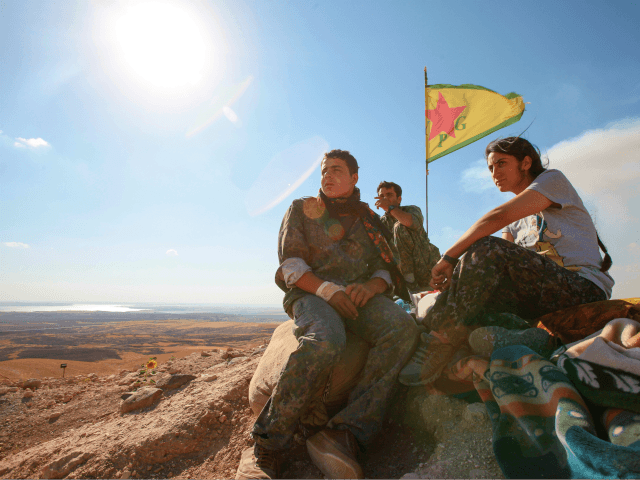
A Kurdish People’s Protection Units, or YPG fighters stand near a checkpoint in the outskirts of the destroyed Syrian town of Kobane, also known as Ain al-Arab, Syria. June 20, 2015. (Ahmet Sik/Getty Images)
Turkey considers the YPG to be nothing more than an offshoot of the PKK, another Kurdish militia with dreams of grabbing Turkish territory someday.
Turkish media aligned with Erdogan and his Justice and Development Party (AKP) routinely refer to the PKK and YPG as one and the same, especially after the unsuccessful coup attempt against Erdogan in 2016. The U.S. and Europe insist they are separate, formally recognizing the PKK as a terrorist organization while praising the YPG as regional security partners.

Turkish President Recep Tayyip Erdogan speaks during a ceremony marking the last year’s failed coup, at the Bestepe People’s Culture and Congress Centre in Ankara, on July 13, 2017. (ADEM ALTAN/AFP/Getty Images)
Turkey also views ISIS as a major security threat, so it was grudgingly willing to let the YPG take a leading role against the Islamic State, particularly if fighters from the Iraqi Kurdish militia known as the Peshmerga were also involved in the operations.
The Peshmerga was founded after World War I as a nationalist fighting force devoted to Kurdish autonomy, but later became more of a defensive guerilla militia protecting Iraq’s mountainous Kurdistan region from various threats, including longtime Iraqi dictator Saddam Hussein when he turned against the Kurds for working with Iran. Saddam unleashed a genocidal campaign known as Anfal against the Iraqi Kurds in the late 1980s, notoriously including a monstrous chemical weapons attack against Kurdish civilians in 1988. The Peshmerga ultimately helped the U.S.-led coalition overthrow Saddam in 2003.
Turkey was considerably less suspicious of the Iraq Kurdish force and even helped to supply and train its fighters until Iraqi Kurds voted for independence in a 2017 referendum. Turkey decided the Peshmerga might not be so different from the YPG after all and withdrew its support. Iraqi Kurdistan, however, did not pursue independence despite the referendum that alienated Turkey, and Erodgan’s government patched things up with the Peshmerga, joining forces against the PKK.
As the Syrian civil war began winding down, thanks to Russia and Iran intervening on behalf of Damascus dictator Bashar Assad, Turkey insisted the presence of PKK or YPG units near its border with Syria was an intolerable security risk.
In 2016, a few months after the coup attempt against Erodgan, Turkey launched a ground invasion against ISIS and PKK forces in Syria dubbed “Operation Euphrates Shield.” This was followed in 2018 by “Operation Olive Branch,” and in 2019 by an even larger incursion called “Operation Peace Spring,” whose objective was to establish a deep “buffer zone” free of Kurdish militia forces on the Syrian side of the Turkish border.
Turkey persisted in these invasions despite opposition from Assad and his Russian and Iranian partners, with Erdogan insisting he had no choice but to take drastic action because his years of warnings about the PKK/YPG/PYD threat were not heeded.
The Trump administration controversially withdrew military support for the YPG during Operation Olive Branch in 2018, a move denounced by critics on both sides of the U.S. partisan divide as a backstabbing betrayal of former U.S. allies against ISIS, while Trump insisted U.S. troops had completed their mission against ISIS, and some observers felt Western governments should have paid more attention to Turkey’s security concerns. Suffice to say there are many armed militia groups in Syria, and it is not always easy to tell who they are taking orders from.
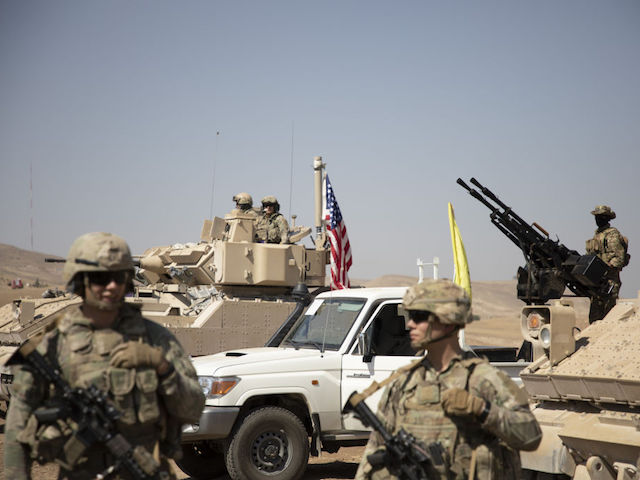
US forces provide military training the Kurdish YPG militia at the Al-Malikiyah district in the Al-Hasakah province, Syria on September 7, 2022. (Hedil Amir/Anadolu Agency via Getty Images)
Turkey also launched a series of cross-border offensives against PKK positions in northern Iraq in 2020. The first two were called Operation Claw Tiger and Operation Claw Eagle, followed by the ongoing Operation Claw Lock in April 2020. The Erdogan government portrayed these actions as a favor to peaceable Kurds in Iraq, who should hate the PKK terrorists as much as Turks do.
“Kurds and Turks are siblings. We’ve shared our bread and water for centuries and the most explicit proof of this is our war graves, where the Turks, Kurds and Arabs lie together,” Turkish Defense Minister Hulusi Akar said in May when declaring early success for Operation Claw Lock.
On Sunday, November 13, a bombing in the busy Taksim Square shopping district of Istanbul killed six people and wounded 81 others. The victims included a 15-year-old girl named Yagmur Ucar and her mother Arzu Ozsoy, plus 9-year-old Ecrin Meydan and her father Yusuf, an employee of the Turkish Ministry of Family and Social Services.
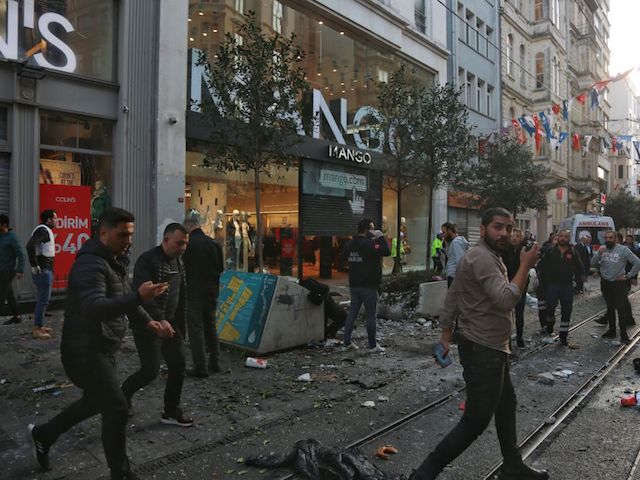
People at the scene after an explosion occurred on Istiklal street, a busy pedestrian thoroughfare on November 13, 2022 in Istanbul, Turkey. (Hakan Akgun/ di images via Getty Images)
Turkish police arrested 47 people in connection with the bombing, including alleged perpetrator Ahlam Albashir, a Syrian woman who reportedly told the police she took orders from the PYD – the political wing of the Syrian YPG militia – and the PKK.
Turkish Interior Minister Suleyman Soylu railed against Western countries for supporting the YPG, rejecting the Biden administration’s message of condolences as “a killer being the first to show up at a crime scene.”
No immediate claim of responsibility for the bombing was made. The PKK and YPG on Monday denied Soylu’s claim that Albashir was a “special intelligence officer” trained by the YPG who carried out an attack planned in the Syrian city of Kobani, which was once the target of an intense attack by the Islamic State. The defeat of ISIS by Kurdish forces at Kobani in 2015 was one of the pivotal events in the fall of the ISIS “caliphate.”
Turkey launched heavy air and artillery attacks into Syria in response to the Istanbul bombing, prompting angry denunciations from the Syrian Democratic Forces (SDF) – the main umbrella for Western-supported anti-ISIS militia, and another group Turkey regards as affiliated with the PKK. The SDF was especially outraged that Turkish strikes hit Kobani, the city where months of hard fighting by Kurdish forces prevented an Islamic State massacre seven years ago.
“Our assessment is that the order for the deadly terror attack came from Ayn al-Arab in northern Syria, where the PKK/YPG has its Syrian headquarters,” Soylu insisted on Monday, using another name for Kobani.
“I emphasize once again: We do not accept the American embassy’s condolences, we reject it. Of course, our alliance with this state should be discussed,” Soylu fumed, making it clear Ankara was in no mood to hear criticism of its choice of targets from Washington.
“These attacks will not remain unanswered. We will respond effectively and efficiently at the right time and place,” the SDF said in response to Turkey’s airstrikes, which the Kurdish group said were responsible for dozens of casualties, including civilians and SDF personnel.
Syrian Kurdish health officials said on Sunday that one of Turkey’s targets was a pediatric hospital under construction near Kobani. The SDF said another target was one of its bases near the town of Qamishli, which is also used by troops from the U.S.-led coalition.
The Syrian Observatory for Human Rights, a London-based monitoring group, said a dozen soldiers from the Syrian army were killed, a report tentatively supported by Syrian state media.
Turkey claimed it struck 89 targets in Syria and northern Iraq over the weekend, all of them PKK military targets. The Turkish Defense Ministry said the bombing campaign was intended to “fend off terror attacks from northern Iraq and northern Syria, provide border security, and destroy terror from its source.”
The Turkish Defense Ministry posted a Tweet proclaiming the bombings were conducted in honor of World Children’s Rights Day to avenge Ecrin Meydan and Yagmur Ucar, the 9- and 15-year-old girls killed in Istanbul. As seen in the accompanying video, the girls’ names were written on two of the bombs Turkey dropped in Syria over the weekend.
“Even though there are those who do not want to see it, the terrorist organization PKK/YPG continues to ruthlessly slaughter babies and children,” the Defense Ministry said. “We will continue to hold the child killers accountable!”
Bugün Dünya Çocuk Hakları Günü!
Görmek istemeyenler olsa da terör örgütü PKK/YPG bu coğrafyada bebekleri ve çocukları acımasızca katletmeye devam ediyor.
Son olarak dünyalar tatlısı Ecrin ve Yağmur’u bizlerden ayırdılar.
Çocuk katillerinden hesap sormaya devam edeceğiz! pic.twitter.com/gLs0B24xsO
— T.C. Millî Savunma Bakanlığı (@tcsavunma) November 20, 2022
President Erdogan said on Tuesday that a new ground invasion against Kurdish forces in Syria would begin shortly.
“We have been bearing down on terrorists for a few days with our planes, cannons and guns. God willing, we will root out all of them as soon as possible, together with our tanks, our soldiers,” he said.
“From now on, there is only one measure for us. There is only one border: the safety of our own country, our own citizens. It is our most legitimate right to go where this security is ensured,” Erdogan vowed.
“We tell all our partners, notably the United States, at every level, that the YPG equals the PKK and persist with our demand that they halt every kind of support for terrorists,” Defense Minister Hulusi Akar added on Tuesday, dismissing calls for restraint from Washington.
Interior Minister Suleyman Soylu continued to be one of the most confrontational Turkish officials, promising on Tuesday that Turkey will not allow the PKK to “establish a terror state around us” and accusing Turkey’s NATO allies of hypocrisy for failing to step quickly to the defense of Turkish civilians.
“NATO rose up because a couple of bombs fell on Poland,” Soylu snarled, referring to the international panic that erupted after what initial reports claimed to be a Russian missile fired at Ukrainian targets landing in Poland. The Associated Press formally retracted the November 15 story and fired the reporter responsible on Tuesday. Updated reports suggested the missile was shot by Ukraine, though the Ukrainian government has denied involvement.
Russia, which continues to support the Assad regime in Syria, said it understands Turkey’s anger, but told Erdogan to proceed with caution.
“We understand and respect Turkey’s concerns about ensuring its own security. We believe this is Turkey’s legitimate right. At the same time, we call on all parties to refrain from steps that could lead to the destabilization of the overall situation,” Kremlin spokesman Dmitry Peskov said on Tuesday.
Russian President Vladimir Putin’s envoy to Turkey, Alexander Lavryentyev, said he hoped it would be possible to “convince our Turkish partners to refrain from excessive use of force on Syrian territory.”
The Kurds are also under attack from Iran, which claims Kurdish subversives are working with foreign governments to destabilize Iran through the Mahsa Amini protests.
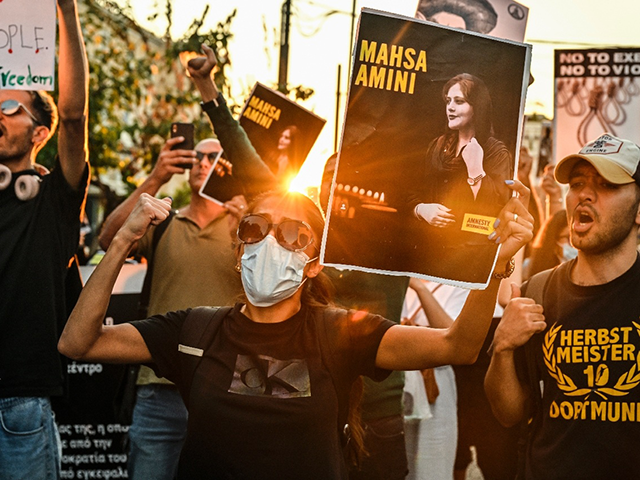
A protester holds a portrait of Iranian Mahsa Amini during a demonstration by Iranians living in Greece in central Athens on September 24, 2022, following the death of an Iranian woman after her arrest by the country’s morality police in Tehran. (LOUISA GOULIAMAKI/AFP)
Amini was a 22-year-old Kurdish woman who was killed by Iran’s “morality police” while visiting Tehran in September. The Iranian theocracy’s increasingly brutal crackdown on nationwide protests against her death, and the strict Islamic headscarf law she was killed for allegedly violating, has been especially rough on the Kurds.
Iran has conducted three rounds of intense drone and missile strikes against Iraqi Kurdistan since the Amini protests began. Like Turkey, Iran claims Kurdish separatist militants based in Iraq are conducting terrorist operations.
Iran’s nemesis is the Kurdistan Democratic Party of Iran (KDPI), a militant group dating back to 1946 whose current agenda of autonomy for the oppressed Kurds of Iran is not dissimilar to the PKK’s post-2010 autonomy demands for Turkish Kurds. Despite these ideological similarities, the KDPI and PKK are enemies who have been fighting a sporadically violent “cold war” over turf in Iraq for the past decade.
The Iranian Islamic Revolutionary Guard Corps (IRGC), the theocratic wing of the Iranian military and a designated terrorist organization, vowed in September to relentlessly attack the exiled KDPI in its bases on Iraqi soil unless the governments in Iraqi Kurdistan and Baghdad fulfill their security “commitments” by expelling those “terrorist groups.”
The U.S. Central Command condemned Iran’s missile and drone strikes against targets near the Iraqi Kurdistan capital of Erbil on Sunday.
“Such indiscriminate and illegal attacks place civilians at risk, violate Iraqi sovereignty, and jeopardize the hard-fought security and stability of Iraq and the Middle East,” said CENTCOM chief Gen. Erik Kurilla.
Kurdish human rights groups say the IRGC is sending troops and fighting vehicles into impoverished towns in the Iranian Kurdish region to suppress the Amini uprising, killing several civilians over the past few days, including children.
Iranian security forces have used lethal force to suppress frequent large demonstrations and memorial services in Saqez, Mahsa Amini’s hometown, but the greatest fears of a massacre currently concern Mahabad, a large Kurdish-majority city in western Iraq where the IRGC and affiliated militia are making a fearsome show of force:
PLEASE WATCH WITH SOUND ON!
The Islamic Republic is conducting a massacre in the city of Mahabad which is majority Kurdish!
They are shooting at people and into homes!
They have cut the electricity!
The people of Iran need your attention urgently!
Please do not turn away! pic.twitter.com/PHd94VrnLI
— Yashar Ali 🐘 یاشار (@yashar) November 20, 2022
Kurds in Mahabad claim the IRGC has fired on hundreds of protesters, some of whom died from untreated wounds while barricaded in their homes because Iranian forces threatened to arrest or kill anyone who takes to the streets.
Videos uploaded to social media showed convoys of armored vehicles carrying heavy weapons rolling into the city and captured the sound of machine gun fire, while Iranian state media insisted the IRGC was merely conducting a counter-terrorism operation and was welcomed by local residents.
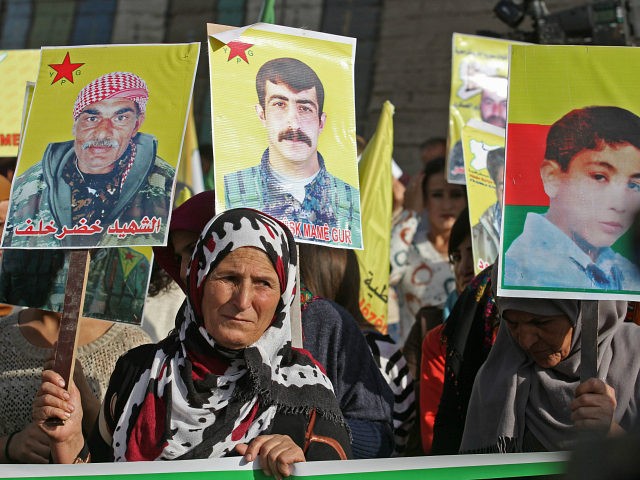
COMMENTS
Please let us know if you're having issues with commenting.